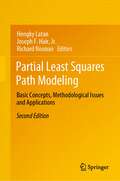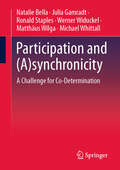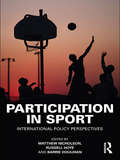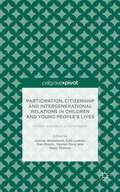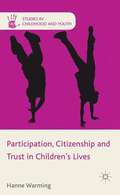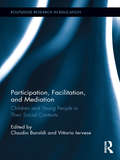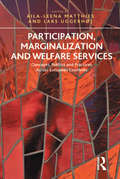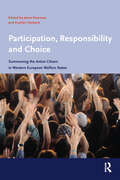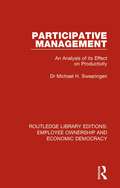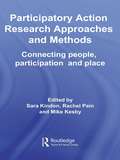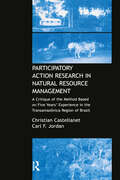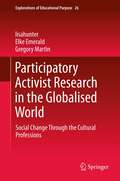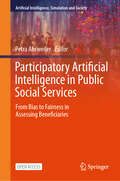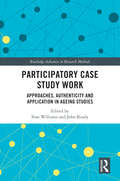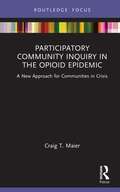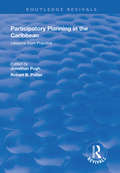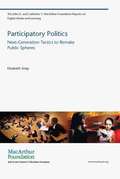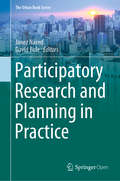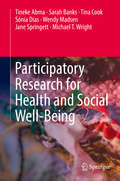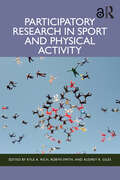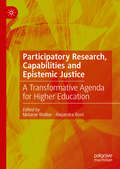- Table View
- List View
Partial Least Squares Path Modeling: Basic Concepts, Methodological Issues and Applications
by Hengky Latan Richard Noonan Joseph F. Hair Jr.Now in its second edition, this edited book presents recent progress and techniques in partial least squares path modeling (PLS-PM), and provides a comprehensive overview of the current state-of-the-art in PLS-PM research. Like the previous edition, the book is divided into three parts: the first part emphasizes the basic concepts and extensions of the PLS-PM method; the second part discusses the methodological issues that have been the focus of recent developments, and the last part deals with real-world applications of the PLS-PM method in various disciplines.This new edition broadens the scope of the first edition and consists of entirely new original contributions, again written by expert authors in the field, on a wide range of topics, including: how to perform quantile composite path modeling with R; the rationale and justification for using PLS-PM in top-tier journals; psychometric properties of three weighting schemes and why PLS-PM is a better fit to mode B; a comprehensive review of PLS software; how to perform out-of-sample predictions with ordinal consistent partial least squares; multicollinearity issues in PLS-PM using ridge regression; theorizing and testing specific indirect effects in PLS and considering their effect size; how to run hierarchical models and available approaches; and how to apply necessary condition analysis (NCA) in PLS-PM.This book will appeal to researchers interested in the latest advances in PLS-PM as well as masters and Ph.D. students in a variety of disciplines who use PLS-PM methods. With clear guidelines on selecting and using PLS-PM, especially those related to composite models, readers will be brought up to date on recent debates in the field.
Participant Observation in Organizational Settings
by Robert BogdanThis albeit dated text explains data collection and analysis procedures for participant observation.
Participation and (A)synchronicity: A Challenge for Co-Determination
by Ronald Staples Werner Widuckel Michael Whittall Natalie Bella Julia Gamradt Matthäus WilgaThe book addresses digital transformation in companies and examines the changes for workplace stakeholders. The focus is on how co-determination interacts with digital transformation. This also puts a transformation of co-determination itself on the agenda, during which the direct participation of employees expands significantly in the interest-political positioning of works councils. Moreover, participation becomes a strategic resource for co-determination.
Participation and Democratic Theory
by Carole PatemanShows that current elitist theories are based on an inadequate understanding of the early writings of democratic theory and that much sociological evidence has been ignored.
Participation in Child Protection: Theorizing Children's Perspectives
by Mandy DuncanThere have long been doubts within social work about the viability of reconciling participatory practice with the statutory power that comes hand-in-hand with child protection work. This book explores this issue by proposing an original theory of children’s participation within statutory child protection interventions. It prioritises children’s voices through presentation of a wide collection of children’s experiences of the child protection system including three unique in-depth accounts. Identifying the different ways in which children engage with professionals in the child protection process, Duncan explores why they act in the ways that they do. The book reveals why some children are sceptical participants or become disaffected with the system whilst others participate more positively within it. Participation in Child Protection will be of interest to students and scholars across a range of disciplines, including social work, sociology, psychology, counselling, law and education, as well as child protection professionals such as social workers, child protection police officers, health visitors and teachers.
Participation in Sport: International Policy Perspectives
by Matthew NicholsonAlthough there is growing interest from governments in participation levels in sport, the extent to which governments actively promote ‘sport for all’ and their motives for doing so vary greatly. This is the first book to examine the sport participation policies of national governments across the world and to offer a comparative analysis of the motives for, and successes and failures of those policies. Organized around a series of sixteen national case studies, including the UK, the US, Australia, China and India, the book enables students and practitioners to compare and contrast the development, implementation and impact of sport participation policies throughout the world. An introductory chapter provides a framework for understanding and interpreting those case studies and each chapter then addresses the following key themes: national structures for sport national sporting cultures participation levels in organized sport the nature and extent of government intervention implementation of governmental policy the impact of government policy. With contributions from many of the world’s leading experts on sport policy and sport development, this book is essential reading for anybody with an interest in the role of governments in relation to supporting and regulating their citizens’ involvement in sport.
Participation, Citizenship and Intergenerational Relations in Children and Young People’s Lives: Children and Adults in Conversation
by Nigel Thomas Cath Larkins Joanne Westwood Dan Moxon Yasmin PerryResearch about children and young people's participation and involvement in research is an emerging area of academic inquiry. Based on the themes of participation, citizenship and intergenerational relations, this edited collection draws on the latest research in this area, and includes chapters co-authored with children and young people.
Participation, Citizenship and Trust in Children’s Lives
by Hanne WarmingThis book critically analyzes and theorizes trust dynamics in children's lives and how they impact upon children's participation, citizenship and well-being, drawing on a wealth of empirical evidence that examines trust in various institutional and cultural contexts.
Participation, Facilitation, and Mediation: Children and Young People in Their Social Contexts (Routledge Research in Education)
by Claudio Baraldi Vittorio IerveseTraditionally, children have been considered from a primarily developmental perspective, in need of education in order to achieve autonomy, growth, and eventually adulthood. Childhood studies have recently underlined an alternate way to look at children, starting from the consideration that children are competent social actors and can actively participate in social life. However, there has been relatively little attention paid to the ways in which adults can actively empower children’s agency and participation. This book aims to highlight this important aspect, explaining the position of adults as facilitators and mediators in the process of constructing childhood.
Participation, Marginalization and Welfare Services: Concepts, Politics and Practices Across European Countries
by Aila-Leena Matthies Lars UggerhøjCurrent debates around participation and marginalization dominate the agenda of many European political forums. There is an increasing concern about the stability of social cohesion and a growing number of particular groups of people who are regarded as being at risk of being socially excluded or marginalized. This volume goes beyond the surface of public discussions to look at the central role played by welfare services in European societies in either strengthening or hindering participatory citizenship and democracy. In current discussions welfare services - understood in a broad sense - are centrally positioned: there are high expectations that welfare services can hinder marginalization and enable participation. Yet marginalization is, in most cases, rooted in the deeper structures of society, with economy, participation and involvement dependent on political or highly personal factors, which are beyond the scope of welfare services. This groundbreaking volume posits that participation and marginalization are ’twin’ concepts, expressing opposing sides of one and the same processes faced by individuals and communities. It will be essential reading for social workers, sociologists and policy-makers throughout Europe.
Participation, Responsibility and Choice: Summoning the Active Citizen in Western European Welfare States (Care & Welfare)
by Janet Newman Evelien TonkensResponsibility, participation and choice are key policy framings of active citizenship, summoning the citizen to take on new roles in welfare state reform. This volume traces the emergence of new discourses and the ways in which they take up and rework struggles of social movements for greater independence, power and control. It explores the changing cultural and political inflections of active citizenship in Germany, Finland, Norway, the Netherlands, France, Italy and the UK, with ethnographic research complementing policy analysis. The editors then look across the volume to assess some of the tensions and contradictions arising in the turn to active citizenship. Two final chapters address the reworking of citizen/professional relationships and the remaking of public, private and personal responsibilities, with a particular focus on the contribution of feminist research and theory.
Participative Management: An Analysis of its Effect on Productivity (Routledge Library Editions: Employee Ownership and Economic Democracy #13)
by Dr Michael SwearingenThis study, first published in 1997, examines the relationship between the style of management used and the level of productivity, measured in terms of the organization’s financial stability. Other variables examined include the age of the top level managers, their educational level, the size and age of the organization, and the organization’s physical parameters. By determining whether or not productivity is affected by the use of a participative style of management, the author is laying the groundwork for making companies more competitive.
Participatory Action Research
by William Foote WhyteThis text provides perspectives on the practice and evolution of participatory action research.
Participatory Action Research Approaches and Methods: Connecting People, Participation and Place (Routledge Studies in Human Geography)
by Rachel Pain Mike Kesby Sara KindonParticipatory Action Research (PAR) approaches and methods have seen an explosion of recent interest in the social and environmental sciences. PAR involves collaborative research, education and action which is oriented towards social change, representing a major epistemological challenge to mainstream research traditions. It has recently been the subject of heated critique and debate and rapid theoretical and methodological development. This book captures these developments, exploring the justification, theorisation, practice and implications of PAR. It offers a critical introduction to understanding and working with PAR in different social, spatial and institutional contexts. The authors engage with PAR’s radical potential, while maintaining a critical awareness of its challenges and dangers. The book is divided into three parts. The first part explores the intellectual, ethical and pragmatic contexts of PAR; the development and diversity of approaches to PAR; recent poststructuralist perspectives on PAR as a form of power; the ethic of participation; and issues of safety and well-being. Part two is a critical exploration of the politics, places and practices of PAR. Contributors draw on diverse research experiences with differently situated groups and issues including environmentally sustainable practices, family livelihoods, sexual health, gendered experiences of employment, and specific communities such as people with disabilities, migrant groups, and young people. The principles, dilemmas and strategies associated with participatory approaches and methods including diagramming, cartographies, art, theatre, photovoice, video and geographical information systems are also discussed. Part three reflects on how effective PAR is, including the analysis of its products and processes, participatory learning, representation and dissemination, institutional benefits and challenges, and working between research, action, activism and change. The authors find that a spatial perspective and an attention to scale offer helpful means of negotiating the potentials and paradoxes of PAR. This approach responds to critiques of PAR by highlighting how the spatial politics of practising participation can be mobilised to create more effective and just research processes and outcomes. The book adds significant weight to the recent critical reappraisal of PAR, suggesting why, when, where and how we might take forward PAR’s commitment to enabling collaborative social transformation. It will be particularly useful to researchers and students of Human Geography, Development Studies and Sociology.
Participatory Action Research in Natural Resource Management: A Critque of the Method Based on Five Years' Experience in the Transamozonica Region of Brazil
by Carl F. Jordan Christian CastellanetThis work evaluates the merits of a widely-used approach to natural resource management, participatory action research (PAR), an approach to resource management that strives to link researchers with farmers and other local residents whose lives are effected by long-range conservation programmes. The authors begin the book with the history of PAR, and then use a variety of case studies that chronicle sustainable development efforts in Brazil. They evaluate the strengths and weaknesses of these efforts and suggest specific ways to improve on future PAR efforts.
Participatory Activist Research in the Globalised World
by Gregory Martin Elke Emerald LisahunterAction research was conceived as a method of collaborative, self-reflective problem-solving in a community context. Yet many believe it has evolved too far away from its original, directly activist roots. As a direct response to calls for a rejuvenation of the social agenda of 'action research', this volume provides an all-inclusive road map to generating and implementing politically active grass-roots research activities. It is a priceless practical guide for the newly minted researcher wanting to make a tangible difference in their profession and in the world. Where some action research models have been criticized for losing focus on the participatory and social justice roots of this type of research, this book puts social justice activism squarely center stage, guiding the researcher through the theoretical, methodological and practical considerations and constraints of developing, implementing and sustaining research in the cultural professions. Lcating and contextualizing the history and theory of action research, critical theory and other related methodologies and concepts, this volume takes the reader on a journey that begins with the formation of a question, puzzle or research idea right through to the publication of a report on your finished project. Including discrete sections on every stage in the process, from generating a social justice activism agenda, through forming a team and empowering participants, to ensuring the implementation of your agenda and publishing and disseminating your work. Engaging their readers with a fresh acronym, PAtR--Participatory Activist Research--the authors give fresh impetus to those looking for a systematic way to understand and shape practice in their daily work, their profession and their world. This is an outstanding book that represents a critical research process sorely needed in the academy today. Any researcher interested in making an intervention into the egregious social conditions wrought by neoliberal capitalism would do well to read this book. An important contribution to the literature on research methodology. Peter McLaren, Professor, School of Critical Studies in Education, University of Auckland This is an outstanding book that represents a critical research process sorely needed in the academy today. Any researcher interested in making an intervention into the egregious social conditions wrought by neoliberal capitalism would do well to read this book. An important contribution to the literature on research methodology. Peter McLaren, Professor, School of Critical Studies in Education, University of Auckland
Participatory Artificial Intelligence in Public Social Services: From Bias to Fairness in Assessing Beneficiaries (Artificial Intelligence, Simulation and Society)
by Petra AhrweilerThis open access edited volume focuses on fairness issues concerning the use of artificial intelligence (AI) for social service provision in national welfare systems. With this, it touches upon important questions in the innovation agenda of countries across continents about the ethics, justice, quality, responsibility, accountability, and transparency to use AI for state functions. The volume shows that in many countries, AI, or at least data analytics methods, are already in place to support the assessment of beneficiaries for deciding on the value criteria to distinguish between legal /fraudulent, deserving/non-deserving, or needy/non-needy recipients. The book provides a cross-cultural comparison of AI-based social assessment among national welfare systems of 9 countries across 4 continents: Spain, Estonia, Germany, Iran, India, Nigeria, Ukraine, China and USA. Based on participatory research results from multi-stakeholder inputs, especially those from vulnerable groups, the chapters in this volume show that value criteria for fairness and social justice are context-bound and vary across the globe. Furthermore, they are in constant flux, aligned to social change. Thus, the volume looks at pathways to developing culture-sensitive, responsive and participatory AI for social assessment in public service provision. The contributions are interdisciplinary and introduce perspectives from the fields of sociology, computational social science, computer science and public policy. This topical volume is of interest to a wide readership.
Participatory Case Study Work: Approaches, Authenticity and Application in Ageing Studies (Routledge Advances in Research Methods)
by Sion Williams and John KeadyParticipatory Case Study Work shows academic co-researchers how to adapt and implement their methods so that data collection and analysis is authentically participatory. At the heart of this text is advocating a participatory approach to case study work, with co-construction as a catalyst for shared understanding and action in advancing ageing studies. Whilst case study research has a relatively long tradition in the canon of research methodologies, little attention has so far been paid to the importance and value of participatory case study work. This is surprising as its egalitarian and democratic value-base naturally lends itself to the co-production and co-creation of personal and collective theory drawn directly from lived experience. The book brings together over 15 years’ worth of participatory case study work in ageing studies in which the editors have been actively involved as either front-line researchers or as supervisors to PhD and MPhil studies adopting the methodology, and from where each of the contributors are selected. Real-life case examples are shared in the main chapters of the book and they provide direction as to how learning can be applied to other settings. The chapters also contain key references and recommended reading. This volume will appeal to undergraduate and postgraduate students as well as postdoctoral researchers interested in fields such as: Research Methods, Qualitative Methods, Ageing Studies and Mental Health Studies.
Participatory Community Inquiry in the Opioid Epidemic: A New Approach for Communities in Crisis (Routledge Focus on Communication Studies)
by Craig T. MaierThis book explores a research project focused on finding a community-level response to the opioid epidemic. Grounded in communication ethics, appreciative inquiry, and action research, this book contends that the opioid epidemic in the United States is as much a social disease as it is a pharmaceutical one, arising from a lack of social connection and the “communal literacy” Americans need to deal with the challenges they face together. Asking how Americans can rediscover their social connection to rebuild vibrant, sustainable communities, the author proposes and tests an approach called Participatory Community Inquiry (PCI), which helps groups acknowledge the social goods that unite them, design practices that protect and promote those goods, and undertake actions that can support their common lives. Shaping the conversation on how Americans may rediscover and rebuild the community they have lost, this book will be a key resource for researchers, practitioners, and students in communication studies, sociology, and action research interested in social ethics and community development and organizing.
Participatory Planning in the Caribbean: Lessons from Practice
by Robert Potter Jonathan PughThis title was first published in 2003. Until recently, planning and development in the Caribbean have been "top-down", "centre-out" and "expert-led". For a few years now, though, the region has bowed to the global trend and has experimented with participatory planning methods. Participatory planning is heralded by much of the development community as the most appropriate alternative strategy to the traditional approaches. In this volume, a range of experts drawn from the Caribbean, the United Kingdom and the United States review the current achievements and future prospects for genuinely participative planning in the Caribbean region at the beginning of the 21st Century. Bringing together a wide range of case studies from both the insular Caribbean as well as mainland Central and South America, the book examines issues such as protected area planning, sustainable development councils, gender and development, inner-city redevelopment and community empowerment.
Participatory Politics
by Elisabeth SoepAlthough they may disavow politics as such, civic-minded young people use every means and media at their disposal to carry out the basic tasks of citizenship. Through a mix of face-to-face and digital methods, they deliberate on important issues and debate with peers and powerbrokers, redefining some key dynamics that govern civic life in the process. In Participatory Politics, Elisabeth Soep examines the specific tactics used by young people as they experiment with civic engagement. Drawing on her scholarly research and on her work as a media producer and educator, Soep identifies five tactics that are part of effective, equitable participatory politics among young people: Pivot Your Public (mobilizing civic capacity within popular culture engagements); Create Content Worlds (using inventive and interactive storytelling that sparks sharing); Forage for Information in public data archives; Code Up (using computational thinking to design tools, platforms, and spaces for public good); and Hide and Seek (protecting privacy and information sources). After describing these tactics as they manifest themselves in a range of youth-driven activities -- from the runaway spread of the video Kony 2012 to community hackathons -- Soep discusses concrete ideas for cultivating the new literacies that will enable young people to participate in public life. She goes on to consider some risks associated with these participatory tactics, including simplification and sensationalism, and ways to avoid them, and concludes with implications for future research and practice.
Participatory Research and Planning in Practice (The Urban Book Series)
by Janez Nared David BoleThis open access book provides in-depth insights into participatory research and planning by presenting practical examples of its use. In particular, it describes theoretical and methodological aspects of participatory research and planning, as well as the implementation of participatory processes in fields such as transport planning, cultural heritage management, environmental planning and post-earthquake recovery. Further, it compares participatory planning experiences from different territorial levels – from the macro-regional, e.g. Southeastern Europe, Mediterranean or European metropolitan regions, to national, regional and local levels.The book will help researchers, planners, public administration officials, decision-makers and the general public to understand the advantages, disadvantages and constraints of participatory planning and research. Using various examples, it will guide readers through the theory of participatory planning and research, its methods, and different perspectives on how to use it in practice.
Participatory Research for Health and Social Well-Being
by Sarah Banks Wendy Madsen Jane Springett Michael T. Wright Tineke Abma Tina Cook Sónia DiasThis textbook is a comprehensive guide for students interested in using participatory research to improve people’s health and well-being. It is especially designed for those working in the fields of health and social welfare who are embarking on participatory research for the first time. It covers all phases in participatory research from “getting started,” to “acting for change,” “continuing the journey” and “articulating impact.” Its unique format helps readers understand the essence of participatory research as a comprehensive approach for doing research which is underpinned by a set of fundamental values.The many real life examples of participatory research projects from around the world inspire readers to find creative ways to manage their own research while opening up new horizons in their work.
Participatory Research in Sport and Physical Activity (Qualitative Research in Sport and Physical Activity)
by Robyn Smith Kyle A. Rich Audrey R. GilesThis is the first book to focus on participatory research in the context of sport and physical activity. It explores the transformative potential of participatory research methods and provides an introduction to the practicalities of doing participatory research in sport and physical activity.The book is structured around phases of the research process, covering research design, data collection, data analysis, and knowledge mobilization and translation. Chapters cover research design topics such as building research partnerships, reflexivity and ethical issues; methods such as social photo-elicitation, go-along interviews, and biographical mapping; analytical approaches such as collective memory work and collaborative analysis; and knowledge mobilization and translation topics such as podcasting, digital tools, and peer review. Every chapter includes a review of key developments, a guide to how that approach can be employed, an example from the author’s own work, and critical reflections on how that approach can shape future research and have an impact on public discourse.This book is an invaluable resource for students and researchers working in sport studies, the sociology of sport, sport and exercise psychology, sport management and policy, and human movement and health studies more broadly. It will be particularly useful for those interested in diverse and inclusive approaches to qualitative research methodologies.
Participatory Research, Capabilities and Epistemic Justice: A Transformative Agenda for Higher Education
by Melanie Walker Alejandra BoniThis book explores the potential of participatory research and the capability approach to transform understandings of higher education. The editors and contributors illuminate the importance of epistemic in/justice as a foundation to a reflexive, inclusive and decolonial approach to knowledge, as well as its importance to democratic life and participation in higher education. Drawing together eight global case studies, the authors argue for an ecology of knowledge that expands epistemic capabilities in higher education through teaching, research and policy making. Moreover, the chapters illustrate how these epistemic capabilities can be marginalised by both institutions and structural and historical factors; as well as the potential for possibilities when spaces are opened for genuine participation and designed for a plurality of voices. This book will appeal to scholars of social justice and participatory research as well as ongoing debates around decolonising the academy.
